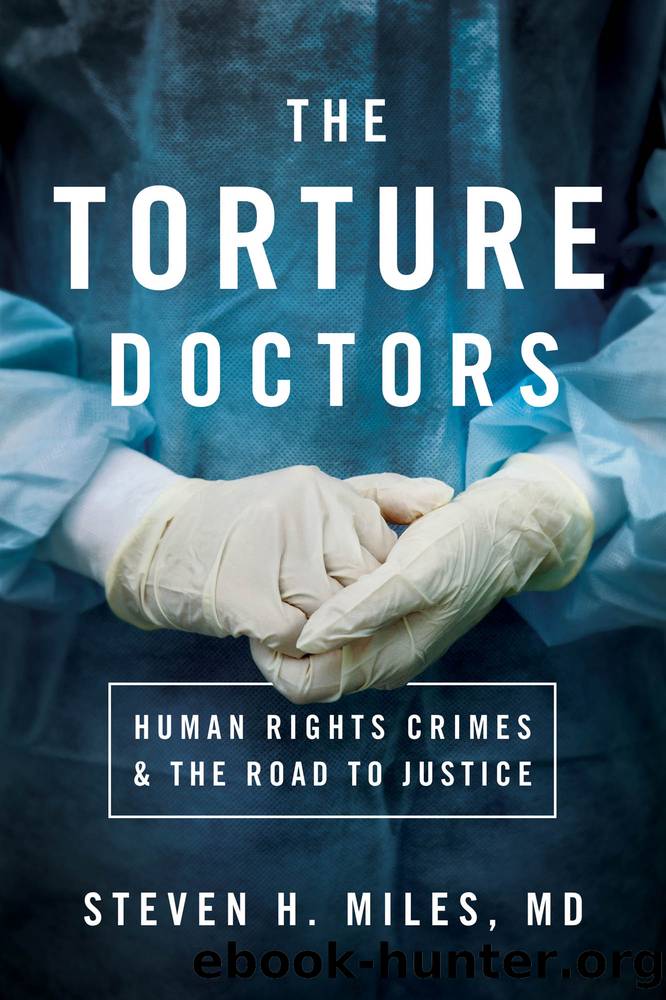The Torture Doctors by Steven H. Miles

Author:Steven H. Miles
Language: eng
Format: epub
Publisher: Georgetown University Press
Published: 2020-08-14T16:00:00+00:00
FIGURE 12.1: Number of physicians held accountable for complicity with torture by courts or medical boards, January 1975–July 2018
Reflecting on the Forms of Accountability
Criminal trials and medical licensing proceedings are very different forms of accountability. Because efforts to hold torture doctors accountable are in their infancy, an enormous amount of scholarship is needed to understand how to most effectively use these two types of accountability in various sociopolitical circumstances.
Courts punish crimes. In many countries torture, as defined in human rights (i.e., the infliction of severe pain by an official), is not a statutory crime. However, its component elements—threats, battery, rape, and murder—are crimes. Domestic courts prosecute those crimes rather than torture. For example, a doctor who falsifies a death certificate to say that a person died of natural causes can be prosecuted for being an accessory to murder. Courts may sentence persons to prison or house arrest. Prison sentences are usually a few years and are often suspended. In some cases, such as the Cabrera case, there may be an irregular early parole (see the introduction). Sentences are more severe in infamous cases that receive public scrutiny, such as those of the Argentine doctors who falsified birth certificates for the babies of murdered women prisoners. Those doctors were charged with abetting kidnapping because the birth certificates diverted children to other families. I do not know of any domestic court that has imposed the death penalty on physicians who assisted torture. Governments shield physicians from the collateral consequences of a trial. Legal costs seem to be paid in large part from military budgets. Some government physicians continue to draw military stipends or pensions after convictions. Governments often allow physicians whose licenses have been revoked continue to practice, as we saw in Chile, Uruguay, and Turkey.
Courts in Argentina, Brazil, Guyana, Italy, South Africa, and the United States have ordered compensation to be paid to victims or their families, as noted throughout this book. Usually the government, rather than a torture doctor, pays. Timor-Leste, Morocco, Sierra Leone, and Peru convened truth commissions that memorialized abuses, set the stage for constitutional or legal reforms, and in some instances, awarded reparations.18 The United Kingdom recently paid reparations to the elderly survivors of torture by castration during the Kenyan fight for independence.19
Medical boards have leverage over torture doctors because physicians are licensed while they torture and they continue to work as licensed physicians when they return to ordinary practice.20 Nations have various structures for exercising power over medical licensing. Some establish national or provincial boards, most with some degree of independence from the Ministry of Health. Some governments charter a medical association to grant and revoke a membership that is in turn a prerequisite for having a license. As we have seen, governments can change these charters to remove the association’s power over licensing (see chapters 1, 11, and 14).
Medical licensing boards punish unprofessional conduct as defined by a medical practice law or regulation. Sometimes the standard of practice is specific, for example, the requirement to accurately complete death certificates.
Download
This site does not store any files on its server. We only index and link to content provided by other sites. Please contact the content providers to delete copyright contents if any and email us, we'll remove relevant links or contents immediately.
| Administration & Medicine Economics | Allied Health Professions |
| Basic Sciences | Dentistry |
| History | Medical Informatics |
| Medicine | Nursing |
| Pharmacology | Psychology |
| Research | Veterinary Medicine |
Periodization Training for Sports by Tudor Bompa(8273)
Why We Sleep: Unlocking the Power of Sleep and Dreams by Matthew Walker(6726)
Paper Towns by Green John(5191)
The Immortal Life of Henrietta Lacks by Rebecca Skloot(4589)
The Sports Rules Book by Human Kinetics(4388)
Dynamic Alignment Through Imagery by Eric Franklin(4217)
ACSM's Complete Guide to Fitness & Health by ACSM(4060)
Kaplan MCAT Organic Chemistry Review: Created for MCAT 2015 (Kaplan Test Prep) by Kaplan(4014)
Livewired by David Eagleman(3775)
Introduction to Kinesiology by Shirl J. Hoffman(3774)
The Death of the Heart by Elizabeth Bowen(3622)
The River of Consciousness by Oliver Sacks(3604)
Alchemy and Alchemists by C. J. S. Thompson(3522)
Bad Pharma by Ben Goldacre(3428)
Descartes' Error by Antonio Damasio(3279)
The Emperor of All Maladies: A Biography of Cancer by Siddhartha Mukherjee(3163)
The Gene: An Intimate History by Siddhartha Mukherjee(3098)
The Fate of Rome: Climate, Disease, and the End of an Empire (The Princeton History of the Ancient World) by Kyle Harper(3067)
Kaplan MCAT Behavioral Sciences Review: Created for MCAT 2015 (Kaplan Test Prep) by Kaplan(2987)
